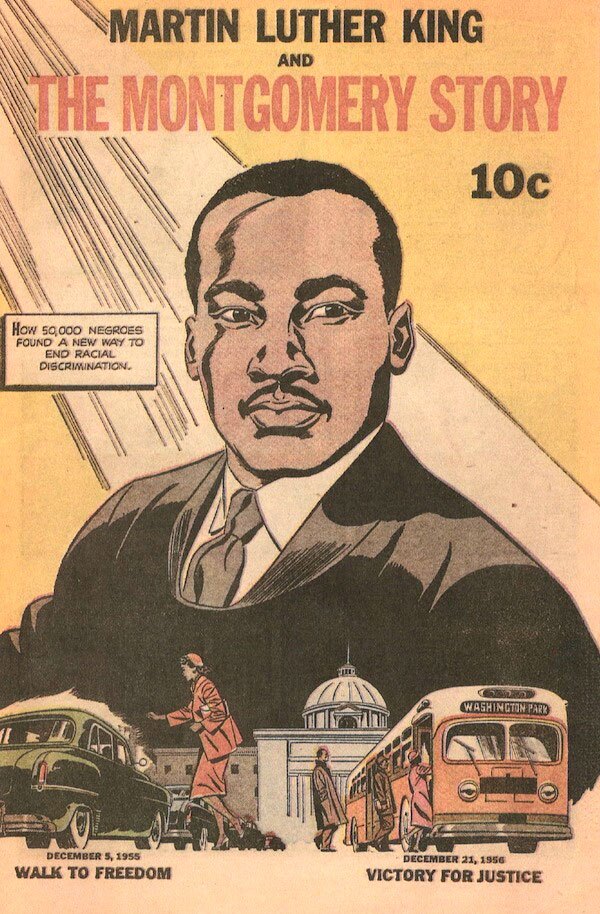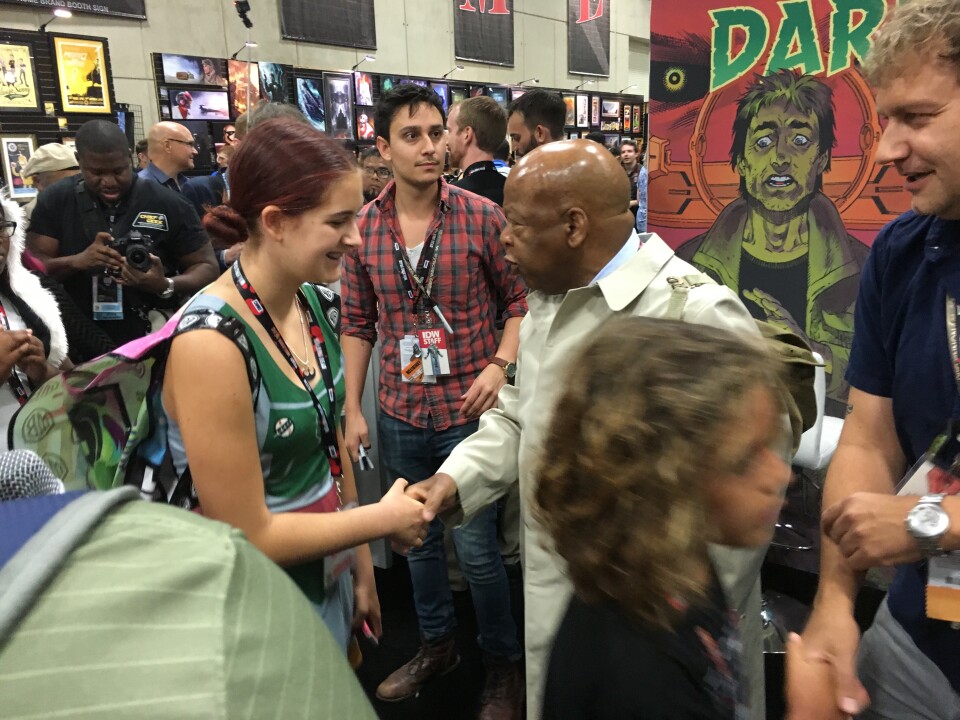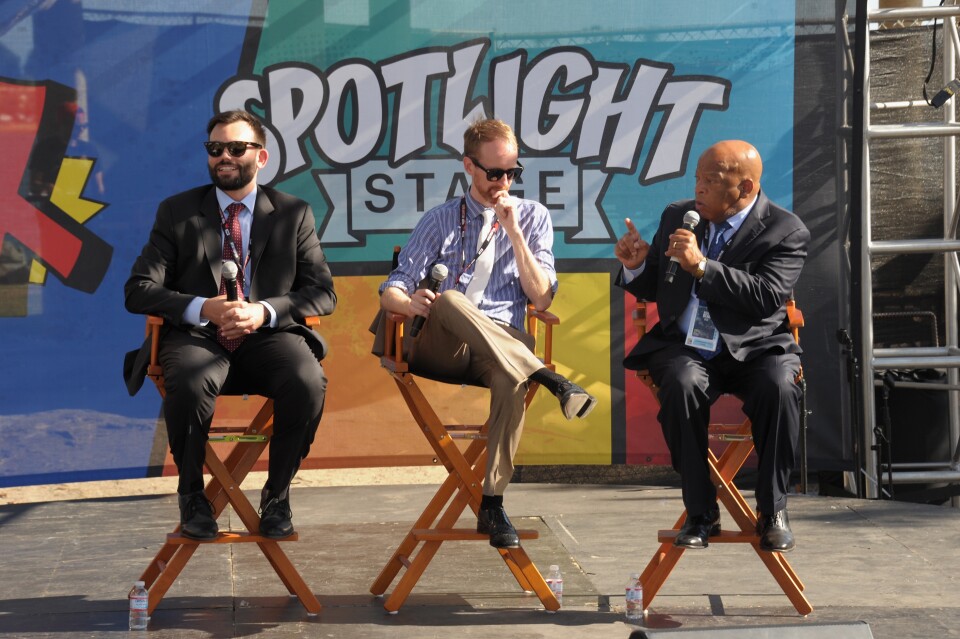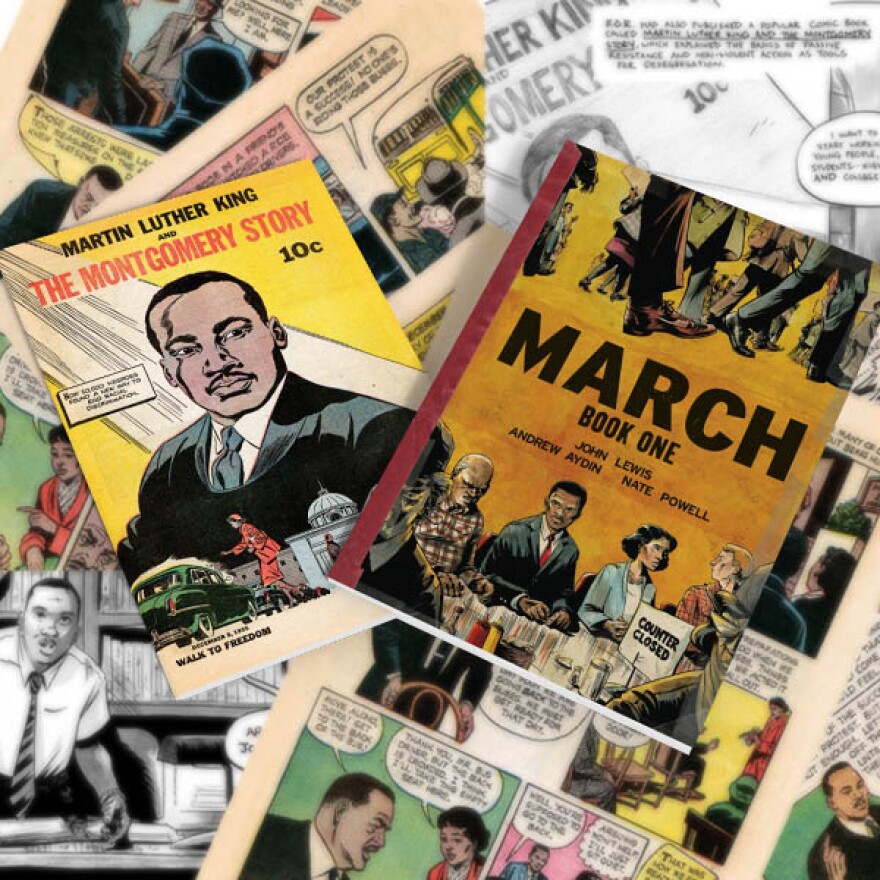The Congressman and civil rights icon was at Comic-Con to introduce the third part of his graphic novel memoir, "March"; there was plenty of news and previews at Comic-Con to keep the fanboys (and fangirls) happy.
Rep. John Lewis' spat with Trump reminds the nation of his civil rights legacy
We revisit our interview from last summer with Congressman John Lewis after a recent spat with President-elect Donald Trump. When the Congressman announced he would not attend Trump’s inauguration, Trump responded with a series of tweets in which he questioned Lewis’ legacy, and inaccurately described Lewis’ district as poverty-ridden.
John Horn interviewed Lewis at Comic-Con 2016 in San Diego where the Congressman was introducing the third part of his graphic novel trilogy, “March.” A few months later, it would become the first graphic novel to win the National Book Award for Young People’s Literature.
How can the youth of today understand the civil rights movement and carry it forward? Civil Rights pioneer and Congressman John Lewis thinks his series of graphic novels, "March," can help.
These books are history but are also a guide. It's a manual to teach and also to inspire. To get young people and people-not-so-young to stand up, speak up and speak out, and find a way to get in the way. To get in, what I call, "good trouble." You see something that's not right, not fair, not just, and you have a moral obligation to do something, to say something and not be quiet. You need to make some noise.
The 76-year-old representative from Georgia has a long and distinguished record in civil rights. He was chairman of the Student Nonviolent Coordinating Committee, better known as SNCC. As part of Mississippi Freedom Summer, Lewis helped lead the effort to register black voters, and was one of the organizers of the Selma-to-Montgomery marches, where in 1965 he and many others were savagely beaten by Alabama state troopers.
Lewis co-authored the "March" series with Andrew Aydin, who also serves as Digital Director and Policy Advisor to the Congressman. The trilogy is illustrated by Nate Powell, whose images depict many of the horrifying events from the civil rights movement, and also celebrate its greatest victories, like the signing of the Voting Rights Acts. The second installment won an Eisner Award for best reality-based work. The third and final book in the series was introduced at Comic-Con 2016.
The Frame's John Horn met with John Lewis, Andrew Aydin and Nate Powell at a San Diego hotel, just steps from Comic-Con prior to their presentation at the convention.
Interview Highlights:
You were only 17 when the 1957 comic, “Martin Luther King and the Montgomery Story,” was published. What did reading that book do for you?
Lewis: I was very inspired by this. I'd heard of Martin Luther King Jr., heard of Rosa Parks. It said to me, If Martin Luther King Jr. and Rosa Parks and others can believe in and accept a way of peace, the way of love, the way of nonviolence, then I too could do something. It made me the person that I am today.

You've co-written these graphic novels — although its not really a novel because it's a true story. What are you able to do in this format that you're not able to do in a memoir?
Lewis: I believe in this format. You are able to make it real, make it plain, make it simple for young people and people not so young to understand. It's drama— high drama. That's what the civil rights movement was all about — drama.
A lot of people, and especially young people, may not fully understand what actually happened during the civil rights movement. How does a book like this change their understanding of what happened? And how does the presentation of a comic affect an audience in ways that a documentary or a book or a movie like "Selma" can't?
Lewis: The writing ability and capacity of Andrew Aydin, the co-author, and the ability of Nate Powell, the artist, make it so real. It tells us, the reader, what happened and how it happened. You can see us sitting down at lunch counter stools and people spitting on us, pouring hot water on us, hot coffee. And we're so orderly and so peaceful and we get arrested and go to jail. It tells stories that are powerful. Just a group of young people, of college students coming together believing in the way of peace, the way of love and the way of nonviolence as a way of living.

Andrew and Nate, how do you see comics as an effective medium for communicating John's story?
Aydin: Comics, I think, are incredibly important right now because of the Internet. The visual literacy that the Internet requires makes comics the language of this generation. If we want to speak with them, we have to speak with them in their language.
Congressman Lewis, do the illustrations in this book trigger memories of things that maybe you had forgotten? Do you start reliving the period by researching it?
Lewis: At times, I had to lay the book aside because I had become very emotional. To re-live what happened in Selma when we tried to walk across the bridge, I kept saying to myself, How could human beings treat their fellow human beings the way we were treated? We had a constitutional right to march in an orderly, peaceful, nonviolent fashion.
To re-live the three murders of civil rights workers in Mississippi or to go to the church in Birmingham for a few hours after the church was bombed and to attend the funeral of the four little girls — you have to relive all of that. It's almost too much.
Congressman Lewis, does it almost feel that even though these books as a trilogy are completed that there's a whole other series of books you could start writing now?
Lewis: I think the climate and the environment and what is happening in America and around the world, I think you could start writing another series.

Your collaborators are nodding in agreement. Do you guys already have plans for how you can pick up the story?
Powell: Generally speaking, one of the biggest considerations, about halfway through making the "March" trilogy, was exactly where we bring it to a close. The end of "March 3" covers what Congressman Lewis considers the end of the movement as he knew it. It does not mean that the work was done or that the movement in a broader sense was done. It expanded and changed fronts. There was enough content in the next few years after, in the late '60s, that we didn't know if that was going to be a long epilogue or a fourth book or exist outside the trilogy. For now, we decided that in a narrative sense the trilogy needs to be self-contained here as an idea, but we always want to emphasize that by no means does that mean that it's this unilateral victory or that the book itself is closed or that it's ever closed.
Aydin: It's dedicated to the past and the future of the movement. For me, seeing Congressman Lewis, he becomes an infectious force in your life. My father was a Muslim immigrant and I never knew him very well. My mother all my life was insistent that I shave. She never wanted me to have a beard or facial hair because she thought it would make me look more Muslim. I was raised Methodist, but, because of my father, she was very sensitive to that. When the Republican nominee started saying all of this stuff and wanting to register Muslims, I grew my beard out because I work on Capitol Hill and I want every one of my colleagues and every one of the members of Congress who sympathizes and empathizes with that position to know who they're talking about and what it is they really are saying to America.
For me, I've heard them say, honestly, It's okay, you're one of the good ones. That's completely unacceptable. So we have to use nonviolence not just as a tool and tactic, but as a way of life and a way of living. We are all trying to do that through "March" as well.
The "March" trilogy was published by Top Shelf Productions. Book 3 will be available in August, 2016.
Comic-Con: Marvel v. DC and who came out on top
One of the biggest conventions in the U.S. took place over recent days — and we don't mean the Republican gathering in Cleveland. Comic-Con International attracted some 130,000 fans of comic books, movies, TV shows and gaming to San Diego over the course of four days.
Two of the juggernauts in the comic book world — Marvel and DC — debuted their upcoming film slates in the largest hall at the San Diego Convention Center — the massive Hall H, which seats more than 6,000 people.
There were new trailers for DC’s “Wonder Woman,” “Justice League” and “Suicide Squad.” And Marvel previewed its “Guardians of the Galaxy” sequel, “Black Panther,” another “Spider-Man” movie and “Doctor Strange.”
Vulture.com senior editor Kyle Buchanan was at Comic-Con and spent the majority of his time in Hall H. The Frame's John Horn spoke with Buchanan about DC and Marvel, and which studio came out on top.
INTERVIEW HIGHLIGHTS
DC has been struggling recently on the film side. "Batman v. Superman" got bad reviews and did not perform well at the box office. But this past weekend, it seemed like they were getting on the right track.
They've been promising their shareholders that they're going to get their act together and make these movies more palatable to a mass audience — and now's their chance. What they really were leaning heavily on was a sense of humor,which I think was very much lacking from what we've seen Zack Snyder do with "Man of Steel" and "Batman v. Superman."
They presented "Wonder Woman," which is directed by Patty Jenkins. It does have a sense of humor [and] was showing off some of those jokes. It has a super-heroine, which Marvel still hasn't had — a full-fledged leading super woman, and "Wonder Woman" is going to get there first next Summer.
Marvel also presented at Comic-Con. Did they impress the audience as they have in years past?
What they had total confidence in is their slate of movies, and when you watch what they're showing us, it's hard not to share that confidence. They have a sequel to "Guardians of the Galaxy," which was a major hit for them. They have "Doctor Strange," which is a new character they're excited about with Benedict Cumberbatch. Tilda Swinton is also in that.
"Black Panther," which the crowd is extremely hyped for, is directed by Ryan Coogler. And the cast is a who's who of black excellence: Chadwick Boseman, Lupita Nyong'o, Michael B. Jordan, Danai Gurira. It looks amazing. And I gotta say, even the "Spider-Man: Homecoming" trailer...
This is reboot number three?
Reboot number three of this character [in less than] 10 years. So not something you would think you would need, but it is the first time that Marvel Studios itself has gotten to put their hands on that character. Marvel Studios has had great success with their "Avengers" universe and they've brought Spider-Man into that.
I really like what I saw. They were going for a high school-John Hughes vibe that was really appealing. They've casted really well — this really ethnically diverse, very now New York kind of vibe. It's so appealing watching Peter Parker and his friends having these high school adventures. [Then] when a giant super villain crashes in, it does come as a shock.
It has taken Marvel 17 movies to hire a non white-male as a director. Taika Waititi is now making a "Thor" sequel. How did DC and Marvel's directing lineup in terms of diversity compare?
Taika Waititi and Ryan Coogler, who is directing "Black Panther," are certainly a step in the right direction for Marvel, though they still haven't hired a woman to direct any of their movies. They will inevitably with "Captain Marvel," which is their new stand-alone movie featuring Brie Larson, but they didn't announce a female helmer.
It's striking because when DC, which is a younger production unit, brought up all of their directors of future movies at their panel, there was that diversity. You had James Wan, an Asian director, who is doing "Aquaman." You had Patty Jenkins, who is doing "Wonder Woman" and was at one time pursued to direct a Marvel movie. They just sort of fell out over creative differences.
You have Rick Famuyiwa who did "Dope" and is directing "The Flash." I'm really excited about that because it's not like they gave Rick the black Warner Bros. character, Cyborg. They gave him The Flash. And rightly so, he's a great director. I really hope that in the future Marvel will start mixing it up.
I have some faith that they will. There was a behind-the-scenes creative, Isaac Perlmutter at Marvel, who is very old-school and used to run their toy division. He was very much insistent on all of the characters having to be white and really focusing on the guys because, "girls don't buy toys and boys don't buy girl toys." I think that with [Perlmutter] having a reduced role now, Kevin Feige, who runs Marvel and who is much more progressive, is really trying to make good and give everybody representation on screen.




